- Home
- V. E. Schwab
The Near Witch Page 2
The Near Witch Read online
Page 2
“What’s the rush?” I ask as my mother’s eyes flick to my waist and the leather strap against my dress, but she says nothing, only turns and glides over to the oven. My mother’s feet rarely touch the ground. She’s not beautiful or charming, except in that way all mothers are to their daughters, but she just flows.
These, too, are morning rituals. My mother’s kiss. Otto’s appearance in our kitchen, regular enough that he could leave his shadow here. His stern eyes as he gives me a sweeping look, snagging on my father’s knife. I wait for him to comment on it, but he doesn’t.
“You’re here early, Otto,” I say, taking a slice of warm bread and a mug.
“Not early enough,” he says. “The whole town’s up and talking by now.”
“And why is that?” I ask, pouring tea from a kettle beside the hearth.
My mother turns to us, flour painted across her hands. “We need to go into town.”
“There’s a stranger,” Otto grunts into his cup. “Came through last night.”
I fumble the kettle, nearly scalding my hands.
“A stranger?” I ask, steadying the pot. So it wasn’t a dream or a phantom. There was someone there.
“I want to know what he’s doing here,” adds my uncle.
“He’s still here?” I ask, struggling to keep the curiosity from flooding my voice. I take a sip of tea, burning my mouth. Otto offers a curt nod and drains his cup, and before I can bite my tongue, the questions bubble up.
“Where did he come from? Has anyone spoken to him?” I ask. “Where is he now?”
“Enough, Lexi.” Otto’s words cut through the warmth in the kitchen. “It’s all rumors right now. Too many voices chattering at once.” He’s changing before my eyes, straightening, shifting from my uncle into the village Protector, as if the title has its own mass and weight. “I don’t yet know for certain who the stranger is or where he’s from or who’s offered him shelter,” he adds. “But I mean to find out.”
So someone has offered him shelter. I bite my lip to swallow the smile. I bet I know who’s hiding the stranger. What I want to know is why. I gulp my too-hot tea, suffering the heat of it all the way down to my stomach, eager to escape. I want to see if I’m right. And if I am, I want to get there before my uncle. Otto pushes himself up from the table.
“You go on ahead,” I say, mustering an innocent smile.
Otto lets out a rough laugh. “I don’t think so. Not today.”
My face falls. “Why not?” I ask.
Otto’s brow lowers over his eyes. “I know what you want, Lexi. You want to go hunt for him yourself. I won’t have it.”
“What can I say? I am my father’s daughter.”
Otto nods grimly. “That much is clear as glass. Now go get ready. We’re all going into the village.”
I lift an eyebrow. “Am I not ready?”
Otto leans across the table slowly. His dark eyes bear down on mine as if he can bully me with a glance. But his looks are not as strong as my mother’s or my own, and they do not say nearly as many things. I stare calmly back, waiting for the last act of our morning rituals.
“Take that knife off. You look like a fool.”
I ignore him, finish my bread, and turn to my mother. “I’ll be in the yard when you two are ready.” Otto’s voice fills the space behind me as I leave.
“You should teach her properly, Amelia,” he mutters.
“Your brother saw fit to teach her his trade,” replies my mother, wrapping loaves of bread.
“It’s not right, Amelia, for a girl, and certainly not one her age, to be out and about with boys’ things. Don’t think I haven’t seen the boots. As bad as walking around barefoot. Has she been in town taking lessons? Helena Drake can stitch and cook and tend…” I can see him running his fingers through his dark hair, then immediately over his beard, tugging his face the way he always does when he’s frustrated. Not right. Not proper.
I’ve just begun to tune them out when Wren appears in the yard out of nowhere. She really is like a bird. Flying off at a blink. Alighting at another. Good thing she’s loud, or else her sudden appearances would be frightening.
“Where are we going?” she chirps, wrapping her arms around my waist.
“Into the village.”
“What for?” She lets go of my dress and leans back to peer up at me.
“To sell you,” I say, trying to keep a straight face. “Or maybe just to give you away.”
My smile cracks.
Wren frowns. “I don’t think that’s why.”
I sigh. The child may look like a bundle of light and joy, but she doesn’t scare nearly as easily as a five-year-old should. She looks up, past my head, and so do I. The clouds overhead are clustering, coming together the way they do each day. Like a pilgrimage—that’s the way my father put it. I slip free of my sister and turn away, toward Otto’s house, and beyond it, hidden by hills, the village. I want to get there as soon as possible and see if my hunch about the stranger is correct.
“Let’s go,” calls my uncle, my mother in tow. Otto eyes the knife at my waist one last time, but only grumbles and sets off down the path. I smile and follow.
* * *
The town of Near is shaped like a circle. There’s no wall around it, but everyone seems to know where it ends and where the countryside begins. Stone walls snake through the village, no higher than my waist and half swallowed by the weeds and wild grass. They wander past clusters of cottages scattered among empty hills or fields, until you reach the center of town, where the structures stand almost side by side. The center of town is filled with seamstresses and carpenters and those who can do their work shoulder to shoulder. Most of the villagers live close to the town square. No one ventures onto the moor if they can help it, but a few cottages, such as our own, and the Thorne sisters’, dot the edges, sitting right up against the seam where Near meets the moor. Only hunters and witches live out this way, they say.
Soon the thickest circle of houses sprouts up into sight. The buildings, all cut stone trimmed in wood and topped with thatch, are huddled together. The newer houses are paler, the older ones darkened by storms and licked by moss and weed. Narrow, well-walked paths run between and around and through everything.
And I can see even from a distance that the center of Near is bustling with people.
News spreads like weeds in a place so small.
When we reach the town square, most of the villagers are already floating about, gossiping and grumbling in turn. As they arrive, they break up into clusters, splitting into smaller and smaller groups. It reminds me of the clouds in reverse. Otto breaks off to find Bo and the rest of his men, probably to dole out orders. My mother sees a few of the other mothers, and gives them a tired wave. She lets go of Wren’s hand, and my sister flutters off into the crowd.
“Look after her,” she says to me, already turning away, gliding in the direction of a group across the square.
I have other plans, but the protest dies in my throat. My mother doesn’t beg. She just gives me the look. The look that says, My husband is dead and my brother-in-law is demanding enough, and I have so little time to myself, and unless you want to be a burden on your poor mother, you’ll be a good daughter and look after your sister. All in a look. In some ways, my mother is a powerful woman. I nod and follow Wren, tuning my ears to the voices, almost all rumors, buzzing and bustling around me.
Wren leads me past Otto and Bo, the two talking in low tones. Bo, a narrow man with a slight limp, is several years younger than my uncle. His nose is long, and his brown hair curls across his forehead but recedes to either side, making him look pointed.
“…saw him by my house,” Bo is saying. “Early enough that it wasn’t too dark, late enough that I didn’t trust my eyes entirely…”
Wren has strayed far ahead now, and Otto casts a look up at me, giving a sideways jerk of his head. I turn and go, making note that Bo lives on the western edge of the village, so the stranger must have ci
rcled Near in that direction. Catching up to Wren, I pass by two families from the southern part of town. I slow my pace, careful to keep my sister in my sight.
“No, John, I swear he towers like a bare tree…” hollers an older woman, holding her arms wide as a scarecrow.
“You’re daft, Berth. I saw him, and he’s old, very old, practically crumbling.”
“He’s a ghost.”
“No such thing as a ghost! He’s a halfling—part man, part crow.”
“Hah! So there’s no ghosts, but there’s half-crow people? You didn’t see him.”
“I did, I swear.”
“He must have been a witch,” a younger woman joins in. The cluster quiets for a moment before John picks back up too emphatically, passing over the remark.
“No, if he was a crow-thing, then that’s a good omen. Crows are good omens.”
“Crows are terrible omens! You’ve lost your mind, John. I know I said it last week but I was wrong. Today you’ve really lost it…”
I’ve lost Wren.
I look around and finally see a slip of blond hair vanishing into a nearby circle of children. I reach the cluster and find my sister, a good head shorter than most of them but just as loud and twice as quick. They are joining hands, preparing to play a game. A girl a year older than Wren named Cecilia, all edges and elbows in a skirt the color of heather, takes my sister’s hand. Cecilia has a scatter of freckles like muddy flecks across her face, vanishing along her cheekbones and into auburn curls. I watch her swing Wren’s small hand back and forth until a shape stumbles into the dirt nearby, letting out a small sob.
Edgar Drake, a boy with a whitish-blond mop of hair, sits in the dirt, rubbing his palms together.
“Are you all right?” I ask, kneeling down and examining his scraped hands. He bites his lip and manages a nod as I clear the dirt away with my thumbs as gently as possible. He’s Wren’s age, but she seems unbreakable, and he is a patchwork of scratches from always falling down. His mother, the village seamstress, has patched his clothes as many times as she’s patched him. Edgar keeps staring sadly at his fingers.
“What does Helena do,” I ask, offering a smile, “to make it better?” Helena is my closest friend and Edgar’s older sister, and she dotes on him incessantly.
“Kisses it,” he murmurs, still biting his lip. I set an airy kiss on each palm. I wonder if I babied Wren like this, would she be so fragile, so shocked by a knick or scrape? Just then she lets out a raucous laugh and calls to us.
“Edgar, hurry!” she shouts, bouncing on her toes as she waits for the game to start. I help the boy up and he hurries over, nearly tripping again halfway there. Clumsy little boy. He reaches the circle and slides in beside Wren and squeezes her right hand, knocking her shoulder with his.
I watch as the game takes shape. This is the same one I used to play, Tyler on one side, Helena on the other. The spinning game. It starts with a song, the Witch’s Rhyme. The song has been around as long as the bedtime stories of the Near Witch, and those have been around as long as the moor itself, it seems. It is a fearfully addictive tune, so much so that it seems the wind itself has taken to humming it. The children join hands. They begin to move in a slow circle as they sing.
The wind on the moors is a’singing to me
The grass, and the stones, and the far-off sea
The crows all watching on the low stone wall
The flowers in the yard all stretching tall
To the garden we children went every day
To hear the witch and watch her play
The children sing faster as they pick up speed. The game always reminds me of the way the wind whips up the fallen leaves, spinning them in tight, dizzying rings.
She spoke to the earth and the earth it cracked
Spoke to the wind and it whistled back
Spoke to the river and the river whirled
Spoke to the fire and the fire curled
But little boy Jack he stayed too long
Listened too close to the witch’s song
Faster.
Six different flowers on the little boy’s bed
Her house it burned and the witch she fled
Cast out, thrown out, on the moor
Near Witch, Moor Witch, now no more
And faster, still.
The witch still a’singing her hills to sleep
Her voice is high and her voice is deep
Under the door the sounds all sweep
Through the glass the words all creep
The Near Witch is a’singing to me
The song starts over.
The wind on the moors is a’singing to me…
The words circle round on themselves until eventually the children fall down, tired and laughing. The winner is the last one standing. Wren manages to stay up longer than most, but eventually even she topples into the dirt, breathless and smiling. The children rise unsteadily and prepare to play again as my mind turns slow circles over the mystery of the stranger, with his eyes that seemed to soak up moonlight, and his blurring edges.
Who is he? Why is he here? And there, softer in my head: How did he vanish? How did he just break apart?
I keep an eye on Wren while hovering on the outskirts of conversations. Several people claim to have seen the shadowy form, but I do not believe them all. I accept that he passed west at Bo’s, north by me. He seems to have walked the invisible line that separates Near from the moor, though how he recognized the boundary I do not know.
The children’s laughter is replaced by a familiar voice, and I turn to find Helena sitting on one of the low walls that taper out along the edge of the square. A group of men and women crowd around her, perhaps the only villagers in the square who aren’t talking. In fact, they are all silent, and Helena herself is the object of their attention. She catches my eye and winks before turning back to her audience.
“I saw him,” she says. “It was dark, but I know it was him.”
She pulls a ribbon from her hair and winds it around her wrist, letting white-blond strands, the same color as Edgar’s, fall over her shoulders. Helena, who never manages to be loud enough, bold enough, is drenched in sun and soaking up every drop of the attention being paid her.
I frown. She isn’t lying. Her pale cheeks always flush at the first wisp of a fib, but these words pour out smooth and sure, her cheeks their usual pink.
“He was tall, thin, with dark, dark hair that fell around his face.”
The crowd murmurs collectively, growing as people peel themselves away from other groups. Word spreads through the town square that someone has had a good long look at the stranger. I press through the bodies until I am at her side, the questions bubbling up around us. I squeeze her arm.
“There you are!” she says, pulling me close.
“What’s going on?” I ask, but my question is swallowed by a dozen others.
“Did he speak to you?”
“Which way was he headed?”
“How tall was he?”
“Give her air,” I say, noticing my uncle over their heads, across the square. He has seen the gathering crowd around Helena, and is turning toward us to investigate. “A moment’s air.” I tug Helena aside.
“Did you really see him?” I hiss in her ear.
“I did!” she hisses back. “And Lexi, he was gorgeous. And strange. And young! If only you could have seen him, too.”
“If only,” I whisper. There are too many voices chirping about the stranger, and too many eyes looking for him. I won’t add mine to them. Not yet.
The group around us has grown, and the questions redouble. Otto is crossing the square.
“Tell us, Helena.”
“Tell us what you saw.”
“Tell us where he is,” says a male voice, his tone tinged with something more severe than curiosity. Bo.
Helena turns back to her audience to answer, but I grab her arm and pull her to me, a bit forcefully. She gives a small cry.
“
Lexi!” she whispers. “Easy.”
“Hel, it’s important. Do you know where he is now?”
“Indeed,” she says. Her eyes shine. “Don’t you? Lexi the great tracker, surely you’ve deduced.”
Otto is at the edge of the crowd, touching Bo’s shoulder. The latter whispers something to him.
“Helena Drake,” Otto calls over everyone. “A word.”
She hops down from the wall. My fingers tighten around her arm.
“Don’t tell him.”
She looks back over her shoulder at me. “Why on earth not?”
“You know my uncle. All he wants is to see the stranger gone.” Gone, and everything back the way it was, safe and same. Her pale brows knit. “Just a head start, Helena. Give me that. To warn him.”
The crowd parts for my uncle. ”Good day, Mr. Harris,” Helena says.
Across the square, a bell sounds, followed by another, lower, and a third, lower still. The Council. Otto pauses, turning toward the noise. Three men as old as dirt wait at the door to one of the houses, standing on the steps to be seen. Master Eli, Master Tomas, and Master Matthew. Their voices are withered with age, and so they use their bells instead of shouting to draw their crowd close. They don’t actually do anything but grow older. The Council started out as the three men who faced the Near Witch and cast her out. But these skeletal men on the steps are Council only in title, the inheritors of power. Still, there is something in their eyes, something cold and sharp that makes the children whisper and the adults look down.
People diligently make their way toward the old men. My uncle frowns, torn between questioning Helena and following the crowd. He huffs and pivots, walking back across the square. Helena casts one last look at me and bobs after him.
This is my only chance.
I slip out along the wall, away from my uncle and the cluster of villagers. Leaving the square, I catch sight of Wren with the other children. My mother is beside her now. Otto is taking his spot nearest the three old men, his Protector face on. I won’t be missed.

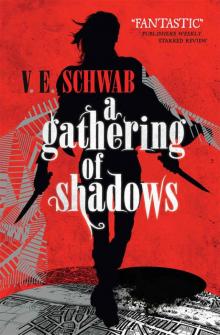 A Gathering of Shadows
A Gathering of Shadows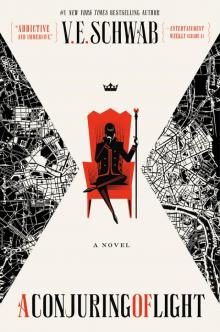 A Conjuring of Light
A Conjuring of Light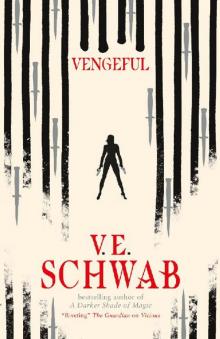 Vengeful
Vengeful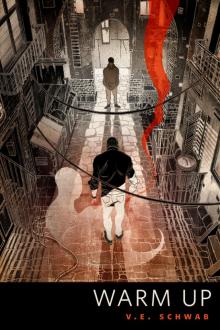 Warm Up
Warm Up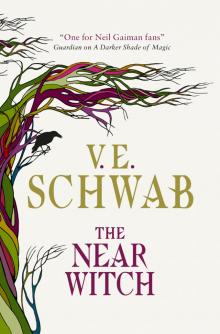 The Near Witch
The Near Witch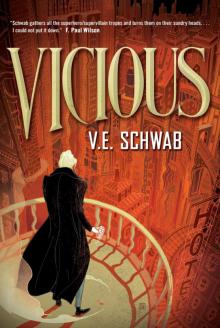 Vicious
Vicious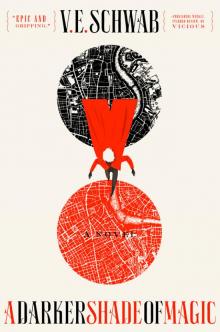 A Darker Shade of Magic
A Darker Shade of Magic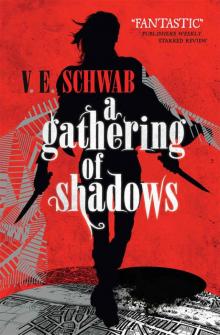 Gathering of Shadows (A Darker Shade of Magic)
Gathering of Shadows (A Darker Shade of Magic)